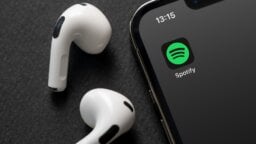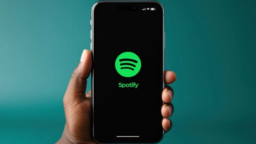“I found it really ironic that the multi-billion-dollar company reacted to criticism with humility, and the start-up with no cash flow reacted to criticism like a corporate machine.”
That was Taylor Swift’s stinging appraisal of Spotify in a Vanity Fair interview this month.
She was obviously referring to CEO Daniel Ek’s notorious blog, written days after Swift pulled her catalogue from his service late last year.
Ek stuck to his freemium guns in the face of Swift’s denunciation that “valuable things should be paid for” – a direct dig at the fact Spotify won’t let artists place their work exclusively on the premium service.
“Taylor Swift is absolutely right: music is art, art has real value, and artists deserve to be paid for it,” he wrote. “We started Spotify because we love music and piracy was killing it.
“So all the talk swirling around lately about how Spotify is making money on the backs of artists upsets me big time.”
Deciphering who is the real ‘corporate machine’ here is not simple: both Ek and Swift are staunchly playing to their own agenda, and the stakes for both parties are frighteningly high.
Yet one thing you can say about Spotify – certainly in comparison to Apple, historically – is that it’s been pretty open to answering tough questions about its model.
If it’s any kind of “corporate machine”, at least it’s one willing to face its critics.
That was certainly the case in Gothenburg over the weekend, where MBW hosted a public Q&A with ‘the Green Swedes’ at the ever-excellent Way Out West music industry conference.
Facing our volley of questions was Sachin Doshi, Spotify’s VP of Content and Distribution (pictured).
We didn’t leave much off the agenda, including Spotify’s profitability, the system by which it pays artists/songwriters, Apple Music and – just for Eddy Cue’s new best friend, Taylor Swift – a growing culture of exclusivity in the streaming world…
Before we get started, could you describe and defend the growth of Spotify’s freemium model?
Spotify launched in late 2008 in an environment where piracy was still rampant. Free music in general was the standard – iTunes had reached some amount of scale but really nothing like the kind of scale that was possible.
Daniel entered into the market with a simple philosophy: if you’re going to get people to pay for music again, you need to give them something better than what’s already available for free.
When you talk about our freemium model, it’s important to note that there are a lot of limitations: it’s not just interruptions by audio ads.
“the success of Our freemium model speaks for itself.”
On our mobile device, you can’t just pick a song and listen to it on-demand, and also you can’t listen offline.
Through these features we’ve managed to get more than 25% of our active users to pay for Spotify, even though we have a compelling free service.
We’ve been able to attract a massive scale of users, over 20m subscribers globally, into our premium service. In that respect the success of the model speaks for itself.
You only crept up over 25% conversion very recently, though – 20m paying subscribers vs. 75m total active users. There seems to be a pervasive and growing belief at the top of the label world that Spotify freemium is too good – and that in order to convert more users into paying subscribers you require more limitations. Should the industry be wary of following that ideology?
Yes, for a few reasons.
On the one hand, free still exists in the market outside of Spotify and freemium services. There’s always a risk.
We’ve done such a great job at Spotify of making piracy irrelevant, but that doesn’t mean it’s gone. It just means there’s no need for it right now.
“We’ve done a great job of making piracy irrelevant. But that doesn’t mean it’s gone.”
You could create that need again if you follow the wrong path.
Despite some of the stuff you might have read in the press, I think the industry does actually agree with a lot of this: instead of making free worse, the right answer is making premium better.
That’s what we’re focused on doing.
Surely that means making certain content available exclusively on the freemium tier?
Not necessarily. I think there are other features we could add that we’re pursuing and trying to understand what the impact would be in terms of creating a better experience.
Our philosophy, not our religion, has always been that as long as a certain type of content is available for free easily for consumers [elsewhere], it doesn’t make sense to gate that content on premium.
And as long as that’s true, we’re going to continue with the model we have.
You mention that some media reporting has painted this subject as an over-simplified ‘labels vs. freemium’ debate. That’s possibly true. But as someone who’s written a lot about it I’d argue there’s been a softening of the language around freemium used by individuals like Lucian Grainge. In an interview last week – tellingly retweeted by the boss of communications at Spotify – Grainge said: “Ad-supported on-demand definitely has a place… whether as part of discovery or trials of new products. Freemium alone is inadequate to support our critical ecosystem.” Do you agree with him?
No, not… it depends on what he means and I haven’t had a chance to ask him.
There are a couple of things to look at with freemium.
First of all our goal has been to scale the number of people who pay for music again. We’ve done extraordinarily well, but we’re still early down the road of the full market opportunity.
We’re very excited at the pace of our growth. Not only are we at 20m subscribers, but we are growing faster than we’ve ever grown before. We’re nowhere near the limit of where premium subscribers can go.
“Not only are we at 20m subscribers, we are growing faster than we’ve ever grown before.”
On the other side of the model, there will always be a certain amount of free music in the market. There has been since the dawn of the music industry.
Look at terrestrial radio, which is the biggest music business in the world – [with ad revenue] that is multiples [bigger] than the recorded music business.
As that listening starts to move over to streaming platforms, we believe we can capture some of that value and share it back with rights-holders, which is currently being done at a very low rate in most markets [by commercial radio networks] and zero in the US [to artists and labels].
Not only is the scale of premium the driver for growing the [music] business again, but there’s this massive [ad-funded] market opportunity that has gone largely untapped to date.
What we think of as the [financial ad-funded opportunity] will double and triple in future.
But you must know patience is running low in the music business with your free tier. What’s coming back to rights-holders is so plainly pitiful compared to subscription revenues. Are you genuinely optimistic you can get ad-supported revenues anywhere near commercial radio?
I am. It will take a little bit of time, right.
Not only is the listening transitioning [from radio to streaming] at a reasonable but not massive pace, also getting advertisers comfortable with the new model will take a little bit of time.
In the coming years we’ll show how fast we can accelerate that growth.
Let’s talk about Apple Music…
We can. If you want [laughs].
Of course! The anecdotal evidence seems to suggest its launch has actually been good for Spotify’s usage numbers. What’s going on?
As I said earlier, and I meant as recently as the last few weeks, we are growing faster than we’ve ever grown before, and we’re growing subscription faster than we’ve ever grown before.
At worst, [Apple Music] is completely incremental to the business.
“Our position is so strong; even when a massive company like apple enters the market, it hasn’t made a blip on our trajectory.”
We’re really excited we’ve continued to grow.
Our position is so strong now; even when a massive company like Apple enters the market, it hasn’t made a blip on our trajectory.
Will you remain ahead of Apple Music as market leader on a global level?
Did you have any expectation I would say no to that?!
Yes, we will. We’re very confident in what our brand means, especially those markets we’ve been in for a while now.
“Through our passion and singularity of focus, we expect advantages that apple will never be able to reach.”
Look, we are a music company. I’m not suggesting that Apple hasn’t been in the music business for a long time or doesn’t care about music. But this is what we do; this is all we do.
Through that passion and singularity of focus, we expect advantages that they’ll never be able to reach.
Do you get frustrated by inefficiencies on the music rights-holder side in the way that money is being distributed?
That’s a dangerous question…
We’ve paid out over $3bn to date, which is an extraordinary amount of money. Yet we continue to hear complaints from some members of the artist community.
More than ever, we are trying to figure out what’s happening; why certain artists don’t feel like they’re seeing a portion of that money.
“We are paying out an extraordinary amount of money. We are trying to figure out why certain artists aren’t seeing it…”
I’m not going to sit here and point fingers until we know exactly what’s happening. But it’s certainly true that with certain artists – the more vocal ones – it’s not that we’re not paying out to them, it’s just that they’re not seeing the money…
Until we really understand what’s happening and where the money’s going, it’s hard to blame any particularly corner of the rights-holder universe.
Not everybody is taking part in the bonanza that is Spotify at this moment.
What about Kobalt‘s AMRA set up – paying global mechnical collections to songwriters from a single point, outside the US, rather than territory-by-territory. Is that kind of model the future?
It certainly makes life cleaner. Without getting into the [US] regulatory issues, it looks like an ideal in a lot of ways.
“AMRA MAkes life a lot cleaner.”
I don’t assume it’s perfect and I think there’s probably work to be done. But I hope some of the efficiency it creates will be the model we all endeavour towards.
When Apple Music launched, it did so with an exclusive track from Pharrell Williams (not to mention ‘exclusive’ material from Taylor Swift). It’s just launched an exclusive album from Dr. Dre – who is an employee, of course. Are you concerned about this trend?
To date we haven’t really seen any major impact from this kind of behaviour.
By and large [exclusives] have been on a short-term basis and it doesn’t really have any effect on our user growth, engagement or satisfaction.
“To date, we haven’t really seen any effect on user growth from [apple] exclusives.”
The biggest concern is from the consumer experience.
If there is a world in which you have to make a choice between various services based on which artists are your favourite because everyone has their own set of exclusives, that’s a dangerous end state.
It’s not the environment we want to create.
That said, there are going to be opportunities – Apple’s leading the way right now – and we’re going to have to think about how to play that game.
So if a major artist came to you and said ‘let’s do an exclusivity deal’ you wouldn’t count it out?
We can’t ignore it, obviously, if they’re shopping it around. But again, it’s an end state we’d rather avoid.
There’s a lot of chatter in the market at the moment about itemised or pro rata streaming payouts. Currently Spotify pays on a percentage basis out of its ‘big pot’ of streams. If you’re a heavy metal act bringing 1,000 fans into Spotify and all they want to listen to is your music, and then Calvin Harris is taking a big proportion of the money generated by those streams, the frustration is understandable, no?
It is, though I think there is a misconception about what that [pro rata] model really means.
The way we pay out is sometimes confusing to people… there’s a lot of misinformation about who would benefit and who would hurt from the change in the model you mention.
It’s not what most people think. Your hypothetical metal band might be surprised to learn what the results of that shift would be.
“There’s a misconception about what the pro rata pay-out model really means.”
For us it’s a zero sum game – ultimately we’ll pay out the same amount whatever. So it’s about the philosophy behind the payout structure.
To me the idea that a single user pays ten dollars, Euros etc., and whatever they listen to, that share of money goes to [only the artists they play] means you’re taking a transactional model and trying to shove it into a very different business.
The way we pay out is built around the subscription model; how you think about revenue and content costs within its structure.
While I understand the desire behind ‘this is how I used to get paid for CD, why can’t it be the same now?’, I don’t think it necessarily addresses all of the nuances of what subscription means.
So you’re resolute that you’ll remain with the formula you have right now?
I’m a statistician’s son – I don’t believe in certainties. I would never say never, but I think this model works better than any other I’ve seen to date.
The user numbers of YouTube are enormous. The payouts are terrible. We recently saw Sony ignore YouTube and team up with Spotify and Apple to launch One Direction’s recent comeback single. Do you worry about the way the music industry seems to continually rely on YouTube on one hand, then moan about what it pays them on the other?
We’ve used YouTube as a straw man for a while, because it is the biggest free on-demand music service in the world.
Ultimately we need to be treated fairly in the ecosystem. We can moan about it, the labels can moan about it, the artists can moan about it.
“We believe if we’re treated fairly [vs. Youtube], we’ll win – and generate the most money.”
For us the most important thing is being allowed to compete. We believe if we’re treated fairly in the marketplace, we will win; we’ll create the best service, the best user experience and generate the most money.
Where some people play a little fast and loose with rights, we’ve always played fairly with the labels and the artists. We want to be treated fairly [by] them.
When you say ‘treated fairly’, you mean the labels – some still have a mentality that YouTube is a friendly promotional platform, yet Spotify is a money-grabbing commercial enterprise…
Exactly. When you look at the landscape, you have to look at these services not as ‘promotion’ and ‘retail’ anymore, but rather this much murkier spectrum – where all of the services take part in both sides of the traditional, polarised view of the economy.
So long as [labels] are recognising that – saying, ‘We have to treat YouTube as a promotional and a commercial platform,’ – I think we can compete and succeed.
Independent labels are a little worried that the major labels, as they did in the retail world, will be able to leverage their market share and dominate the fast-growing ‘format’ of playlists. I’ve even heard concerns that guaranteed placings in Spotify playlists could be a bargaining chip in certain licensing negotiations. Can you guarantee those labels this isn’t going to happen?
Yes. The way we programme those playlists is all about performance.
While we have an editorial staff building those playlists, they’re constantly edited based on performance. So if tracks in our playlists aren’t performing well, they’re removed.
“Our playlists are constantly edited based on performance. If a track’s not performing well, it’s removed.”
Ultimately, our goal is very singular: create the best user experience.
If the majors are providing great music to power that, great. If they’re not, they won’t be rewarded just because they’re major labels.
The majors and the indies all have equity in Spotify (combined, somewhere around 15% – 20%). Does that leave you compromised at all?
No. It’s important for us to all be aligned and to want the same thing, which is to grow the business; to grow the amounts being paid back to the creators and the rights-holders.
It doesn’t affect our day-to-day business.
It’s hard not to notice a hardline message from Apple recently, particularity from Jimmy Iovine – there’s a keenness to dismiss Spotify as a ‘utility’ and ‘machine-driven’, while painting Apple Music as having the human touch. How much human input goes into what’s picked, played and promoted on Spotify?
Quite a bit. We have a few different teams focused on what’s happening in different parts of music culture everywhere we operate.
We have our editorial staff, which is growing by the minute – we’ve recently hired some star radio programmers from different genres.
And our industry relations team are on the ground, going to shows, effectively operating as an A&R staff to figure out which artists we want to support.
I hate to use the phrase, but these teams are working towards that ‘human’ side – the traditional side of the editorial experience.
“Our industry relations team effectively operate as an A&R staff for Spotify.”
On top of that, last year we acquired The Echo Nest; brilliant minds and brilliant music fans.
A problem with lot of this [Apple rhetoric] is that it suggests when [curation] is done with code, somehow the people behind it don’t like music. That’s absolutely not the case.
A lot of our programmers are the biggest music fans I know; they’re just trying to reach consumers at scale and [curate for] them individually.
Mixing the broadcast view of editorial with a more targeted view from our data is core to what we do.
Will you ever launch a mid-priced tier or bring your monthly subscription price down in order to scale faster?
When we are growing in a market, the most important thing is simplicity of our offer.
The offer we have to date has been very valuable in helping consumers to make a decision and ultimately convert.
It’s not necessarily that we’re at an optimal price point in every market; we know that.
“We’re not necessarily at an optimal price point in every market. We know that.”
Spain is a perfect example of a market where the economy is struggling but [a Spotify subscription] is the same price as in a lot of stronger economies.
Over time, it’s not just a question of lowering or raising the price, it’s about RPU [revenue per user] optimisation.
How do we create a suite of offers that doesn’t confuse the consumer yet which maximises the amount they’re willing to spend?
What exactly that looks like is unclear, but is there a role for it in the future? Absolutely.
Another important number: that $0.007 average per-stream payout Spotify says is making its way to the music business. Is it going to move up or down in the future?
I know it sounds like a dodge, but that’s the wrong way to look at it.
As long as you’re growing the amount that an individual and the collective audience in a market are willing to spend, you’re growing the amount of money that comes back to the music business.
“The potential scale of streaming is unfathomable.”
The potential scale of streaming is unfathomable.
[$0.007] looks like a small number, but when you get [the potential] number of people into the streaming model, you’re taking about trillions of streams.
Seven years into its existence, Spotify is still yet to post a net profit. Losses are growing. Are you ever going to become a profitable company? If so when?
Yes. The question of when is actually a question of when we feel we don’t have to keep investing.
Right now, we’re not profitable because we invest heavily in our growth – in improving our product and bringing it to more and more users.
“When we decide that profitability is the most important thing for our company, we will get there.”
We are optimising for consumer experience and growth – that’s the most important thing for us.
As and when we decide that profitability is the most important thing for our company, we will get there – and frankly we’re set up very well to get there when the time is right.
Songwriters are unhappy with the share of money they are getting from services such as Spotify. According to SNEP, the major labels are keeping over 70% of post-tax revenue from streaming – around 10% is being shared by publishers and composers. Songwriters will project their ire in your direction when they get their statements. Can you do anything about the split of these revenues? Do you want to?
It’s ironic in a lot of ways that the songwriting part of the copyright industry are paid our more dollar-for-dollar in streaming than they were in downloads – especially in the US.
That’s in terms of the percentage of every wholesale dollar that goes back to the industry. In streaming, songwriters and publishers get more.
“We need to figure out where songwriters’ money is going and how it’s being divided. There are a lot of processing issues.”
So then the question is… what’s going wrong? Why is it that songwriters aren’t seeing money if, in fact, the publishing industry is seeing more per dollar?
Similarly, I think we need to figure out where that money is going and how it’s being split.
There are a lot of processing issues that we can help to address – and that we are going to invest in helping to address.
I expect this will go a long way to easing some of that frustration.
Can you elaborate? How are you investing and in what?
I can’t talk too much about it. But songwriting credits, all of those things, are a much murkier area than recorded [rights].
Publishers know that, the services know that and we’re going to work together to fix these problems.Music Business Worldwide





